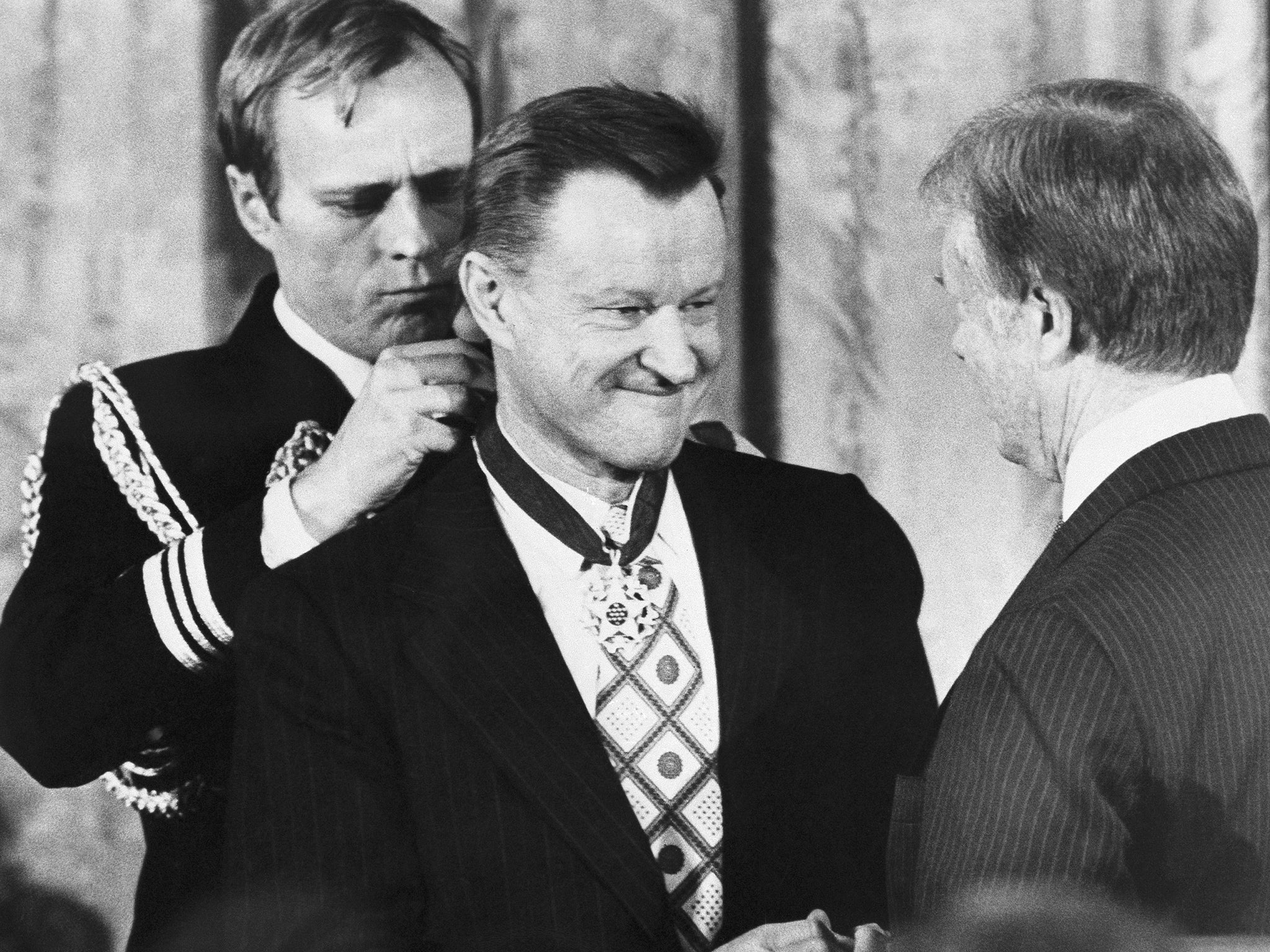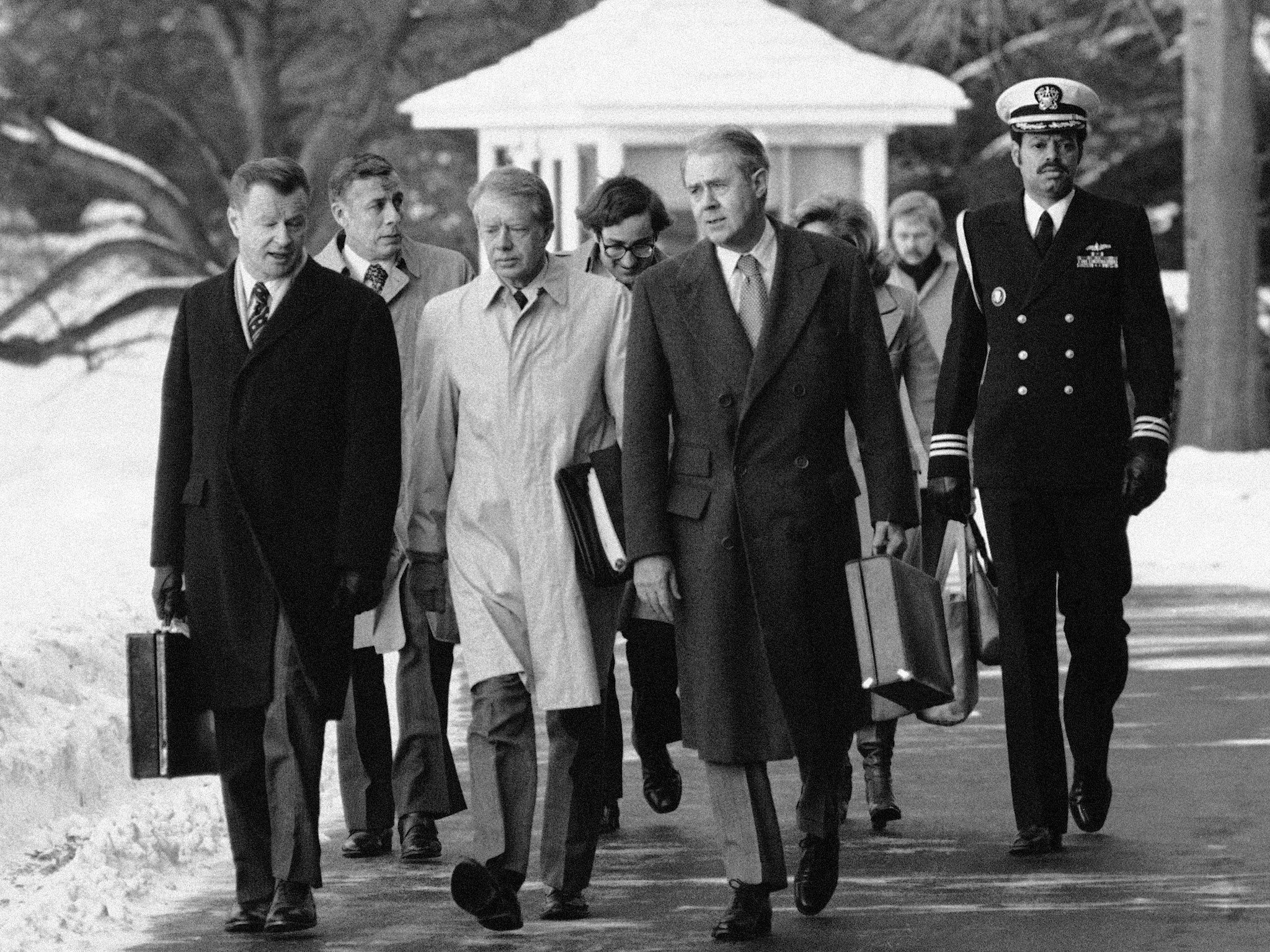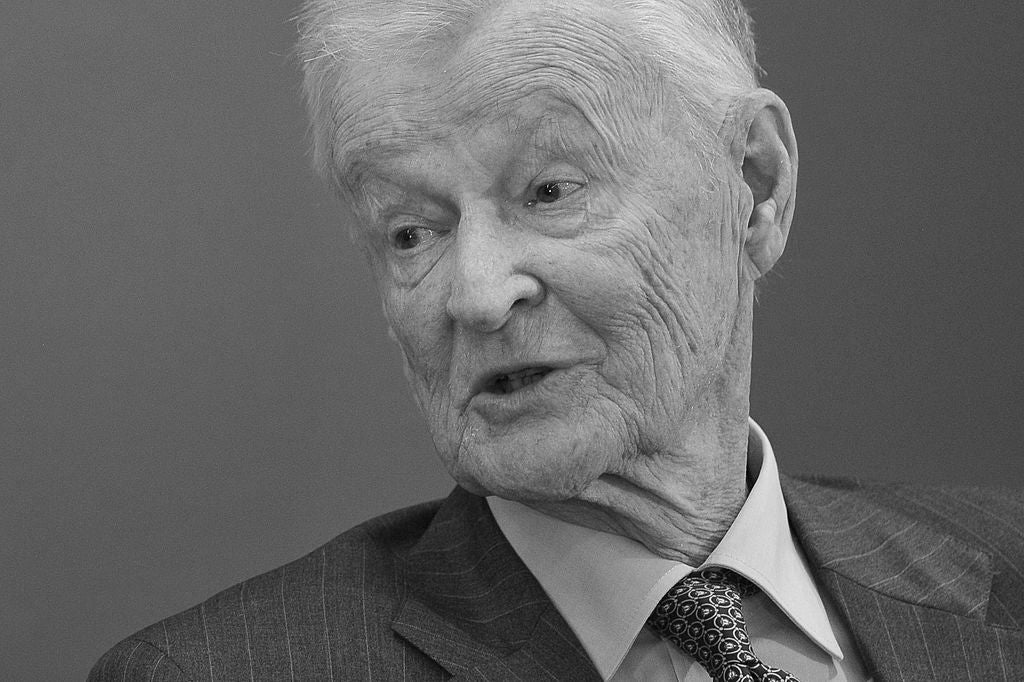Zbigniew Brzezinski, obituary: policy theorist who served as Jimmy Carter's national security adviser
Brilliant but undisciplined, Brzezinski’s tough response to the Iranian hostage crisis contributed to Carter losing the presidency

Zbigniew Brzezinski, or Zbig as he was universally known in Washington to spare excessive strain on unpractised American tongues, was one of three high profile Central Europeans who helped shape US foreign policy in the final third of the 20th century. Henry Kissinger was a German; Madeleine Albright was by birth Czech; Brzezinski was Polish. And he brought to his four years at the heart of power, as President Jimmy Carter’s National Security Adviser, a Pole’s instinctive suspicion of Russia and all its works.
The three overlapped intriguingly. Each made their name in academia. Like Kissinger, Brzezinski came to the US as a young man but never lost his foreign accent. Like Albright, he could be categorised as a hawk on communism, and on communism’s grim afterlife in the former Yugoslavia. Of Kissinger he was a rival, both academically and politically; of Albright he was an early intellectual patron.
Brzezinski’s brilliance was doubted by nobody. What is more, his tough approach to the Soviet Union was vindicated by events when he was in power by Russia’s use of proxy countries to advance its geostrategic ambitions, and by Moscow’s invasion of Afghanistan at the end of 1979. But his tenure at the NSC was chiefly memorable for his running feud with the Secretary of State Cyrus Vance, ever afterward cited as the ultimate case study in how not to run foreign policymaking in Washington.
The two were polar opposites. Vance was among the last of those well-born, well-connected Wall Street lawyers whose attitude to government service was one of noblesse oblige. A self-effacing member of the East Coast establishment, Vance’s instinct was to soothe, negotiate and compromise. Brzezinski was brash and brimming with ideas, a bit undisciplined and a bit of a mischief-maker. Above all he was a firm believer that the only thing Russians respected was strength -- and the readiness to use it.
In the end he outlasted Vance in their bureaucratic war of attrition. All other things being equal, a national security adviser based a few steps from the Oval Office will win out over a Secretary of State. But Brzezinski had the added advantage of Carter’s absolute confidence, while world events went his way. Vance resigned over the decision to try and rescue by force the US hostages in Iran in April 1980. Brzezinski, who championed the rescue bid, remained in office until January 1981, when Ronald Reagan and the Republicans returned to power.

The episode typified Brzezinski’s methods. Knowing Vance’s opposition to the scheme, he worked behind the scenes to convince the President that a bold military operation would rebut the charges of weakness and indecision that threatened his re-election. On 10 April 1980, aware that Vance was leaving for a vacation in Florida, Brzezinski gave Carter a memorandum entitled “Getting The Hostages Free”, in which he argued that negotiating had come to an end and direct action had to be taken.
With Vance away, the decision was taken, and nothing could change Carter’s mind. Vance privately handed his resignation to the President before the mission was attempted on 25 April. Its humiliating failure was the event which above all others sealed Carter’s defeat by Reagan that November.
Out of a government job, Brzezinski returned to teaching and lecturing. He kept up the offensive against the Soviet Union, only from the Washington think tanks and newspaper editorial pages instead of the White House. He encapsulated his views in a 1986 book, Game Plan, a manual of Cold War superpower relations.
Zbigniew Brzezinski was the eldest son of a Polish diplomat, brought up in high Polish Catholic environment. His mother once remembered how he was “very moral, he never missed mass”. From an early age he seems to have been fascinated by foreign affairs. At 10, he started learning Russian from a farmer on the family estate in eastern Poland; Pushkin’s The Captain’s Daughter was his chosen book at elementary school.
He also spent some childhood years in the West when his father was posted to pre-war France and Germany. And when the Communist takeover dashed hopes of a free and independent Poland, the family fled to Canada. There he made rapid progress, securing first class BA and MA degrees in political science from McGill University in Montreal. But bigger fields beckoned the ambitious young man.
The following year he moved south to Harvard where he earned a doctorate and taught political science. In 1958 he took out US citizenship, before moving in 1961 to Columbia University to head the newly formed Institute on Soviet Affairs.
Brzezinski was a legendarily demanding teacher. At Columbia, where he was the PhD adviser of the future Secretary of State Madeleine Albright, he could famously skewer an unprepared student in seconds. He gave out so few A grades that he wrote personal notes to accompany them. Ms Albright became a favourite of his; indeed, it was as a rare female student in his class that she learned she had to be better prepared than the boys to be taken seriously.

Brzezinski, meanwhile, was getting himself noticed in Washington. By the mid 1960s he being consulted by the Johnson Administration on Eastern Europe, and was an adviser on Hubert Humphrey’s 1968 presidential campaign. In 1973 he became the first director of the Trilateral Commission, a body grouping American, Japanese and European business and political leaders.
One of the commission’s members was a young governor of Georgia no less ambitious than himself. The two hit it off, and when Carter announced his candidacy for the White House in 1974, Brzezinski became his foreign policy adviser, and was natural choice for National Security Adviser when Carter won the presidency. Gone, he said, were the bad old days of Kissinger’s “acrobatics”, to be replaced by a considered foreign policy “architecture”.
In fact, an edifice never emerged. Carter was buffeted by crisis after crisis, in Latin America, Iran, Afghanistan, and in a host of countries in Africa. Detente gave way to confrontation with Moscow; rarely in the post-war period had America looked more ineffectual. If Brzezinski wanted to be another Kissinger, he never succeeded.
But he did savour one small triumph. Part of the strategy against Moscow was the “China card”, which Nixon and Kissinger adroitly played. In 1978, Brzezinski went one better, persuading Chinese premier Deng Xiaoping to pay a visit to the US.
That May, the story goes, on one of his many visits to Beijing, Brzezinski was taken for the traditional trek along the Great Wall. “How high did Kissinger get?” Brzezinski asked, according to one witness. His hosts point to the spot. OK, Brzezinski replied, “we’ll go higher”. For much of his career, in academia and in government, Brzezinski had lived in the shadow of Kissinger. In that moment, at least, he surpassed him.
Zbigniew Kazimierz Brzezinski. born 28 March 1928, died 26 May 2017
Rupert Cornwell died earlier this year
Join our commenting forum
Join thought-provoking conversations, follow other Independent readers and see their replies
Comments
Bookmark popover
Removed from bookmarks